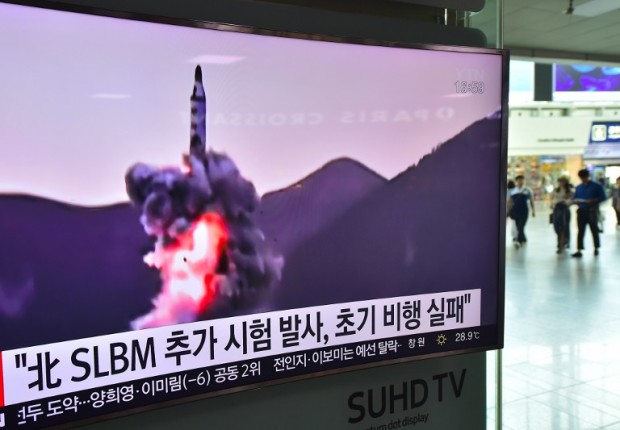
People walk past a television screen at a railway station in Seoul on July 9, 2016, showing file footage of a North Korean missile launch. Seoul reported on Wednesday, August 24, 2016, that North Korea test-fired a submarine-launched ballistic missile (SLBM). The SLBM launch came amid Pyongyang’s threats of a nuclear strike in response to the large-scale military drills being done by the US and South Korea. AFP
SEOUL, South Korea — North Korea test-fired a submarine–launched ballistic missile (SLBM) on Wednesday, days after threatening a nuclear strike in retaliation at the start of large-scale South Korea-US military exercises.
South Korea’s Joint Chiefs of Staff said in a statement that the missile was launched from a submarine in the East Sea (Sea of Japan) at around 5:50 am Seoul time (2050 GMT Tuesday).
The brief statement gave no further details and offered no verdict on the success of the test.
READ: China thwarts UN condemnation of North Korea missile launch
The launch came amid escalating cross-border tensions and just days after tens of thousands of South Korean and US troops kicked off their annual “Ulchi Freedom” military drill.
Seoul and Washington insist such joint exercises are purely defensive in nature, but Pyongyang views them as willfully provocative.
North Korea on Monday condemned the drill as an “unpardonable criminal act,” and warned that any violation of territorial sovereignty would result in a “pre-emptive nuclear strike”.
The two-week annual Ulchi Freedom drill, which plays out a scenario of full-scale invasion by the nuclear-armed North, is largely computer-simulated but still involves around 50,000 Korean and 25,000 US soldiers.
READ: North Korea calls South’s leader ‘psychopath’ over missile row
The exercise always triggers a rise in tensions on the divided Korean peninsula, and this year it coincides with particularly volatile cross-border relations following a series of high-profile defections.
South Korean President Park Geun-Hye further angered Pyongyang this week by suggesting the defections showed “serious cracks” in supreme leader Kim Jong-Un’s regime.
Park also warned that North Korea may carry out “various terror attacks and provocations” in a show of strength aimed at building national unity and loyalty to Kim.
On Sunday the Unification Ministry in Seoul urged all citizens to be on guard against possible North Korean assassination attempts on defectors and anti-Pyongyang activists in the South.
North Korea has conducted a number of SLBM tests — with varying degrees of success.
North Korea has been pushing to acquire an SLBM capability that would take its nuclear strike threat to a new level, allowing deployment far beyond the Korean peninsula and the potential to retaliate in the event of a nuclear attack.
Current UN resolutions prohibit North Korea from any test of ballistic missile technology.